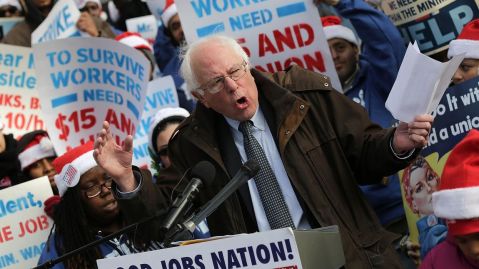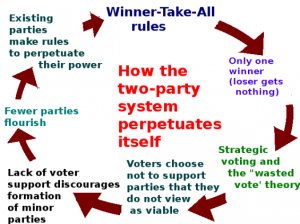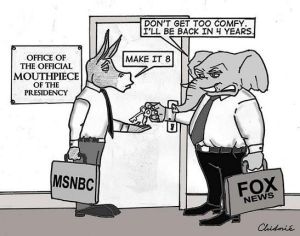Sanders’ candidacy exposes fundamental flaws in U.S. electoral system

Sanders speaks to low-wage federal contract workers on Dec. 4, 2014, during a protest where the workers demanded presidential action to win an increase to $15-an-hour wage. – Win McNamee / Getty Images
A long-time independent and self-described socialist, Vermont Senator Bernie Sanders recently decided to run for president within the confines of the two-party system under heavy pressure from Democratic Party loyalists not to be a third party “spoiler” candidate.
For months, Sanders was the target of public appeals from groups such as Progressive Democrats of America that implored him to seek the nomination of the Democratic Party rather than run as an independent, as he has done in numerous Vermont elections since the 1970s.
As a PDA petition pointed out, in 2004 Sanders “understood the very real danger of total Republican control of the U.S. Government” and “supported Democratic nominee John Kerry for President over his long-time friend and ally, Ralph Nader.”
Similarly, in order “to prevent the current crazed, mean, and dangerous incarnation of the Republican Party from seizing total power,” it is important that Sanders “commit[s] to running in the 2015/2016 Presidential primaries as a Democrat,” PDA insisted.
 The fear of rank-and-file Democrats is that having a third party/independent challenger in a general election between a Democrat and Republican would siphon votes from the Democratic nominee, and hand the election to the Republican nominee. It is a fundamental flaw of the U.S. electoral system that perennial third party candidate Ralph Nader recently spoke about on Democracy Now.
The fear of rank-and-file Democrats is that having a third party/independent challenger in a general election between a Democrat and Republican would siphon votes from the Democratic nominee, and hand the election to the Republican nominee. It is a fundamental flaw of the U.S. electoral system that perennial third party candidate Ralph Nader recently spoke about on Democracy Now.
Asked why Sanders may have decided to forgo his longtime independent status in favor of seeking the Democratic nomination, Nader replied:
Well, that’s always been a dilemma he’s been deliberating for the last year or so. If he runs as an independent, he can go to November. If he runs as a registered Democrat, he’s done in April or May, assuming he doesn’t defeat Hillary Clinton or others, but he gets on the televised primaries. Where as an independent he could be marginalized, as a Democrat he’s going to get on quite a few debates and in the primary.
While what Nader said about the likelihood of being marginalized as an independent is certainly true, what he failed to mention is that it’s not only a candidate’s independent or third-party status that leads to media marginalization, but also – perhaps more importantly – what it is that the candidate has to say.
With his message of income inequality, corporate corruption and environmental sustainability, Sanders was pegged early on as an unserious fringe candidate by the media establishment, which is dominated by the very business interests that he rails against.
Just as Ron Paul’s antiwar message was systematically sidelined from mainstream media coverage in the 2012 presidential campaign – notwithstanding the fact that he ran as a Republican and boasted some traditional early indicators of a vibrant campaign – it seems that the media establishment has already made a determination that Sanders’ candidacy is not to be taken seriously.
 In an analysis for Media Matters for America, Eric Boehlert noted that despite Sanders’ campaign rallies drawing thousands of people – making them some of the largest campaign events of 2015 by either Democrats or Republicans – the media has decided not to cover them as major news events. Sanders’ first major campaign rally since announcing his presidential candidacy last month, for example, was completely ignored by the Washington Post and New York Times, while the network news programs night covered the event sparsely.
In an analysis for Media Matters for America, Eric Boehlert noted that despite Sanders’ campaign rallies drawing thousands of people – making them some of the largest campaign events of 2015 by either Democrats or Republicans – the media has decided not to cover them as major news events. Sanders’ first major campaign rally since announcing his presidential candidacy last month, for example, was completely ignored by the Washington Post and New York Times, while the network news programs night covered the event sparsely.
According to Boehlert, “At a time when it seems any movement on the Republican side of the candidate field produces instant and extensive press coverage, more and more observers are suggesting there’s something out of whack with Sanders’ press treatment. And they’re right.”
When Sanders does get reported on in the media, much of the coverage portrays him as outside the mainstream of American politics, or views him solely through the prism of Hillary Clinton. “It’s all about how his campaign might affect her strategy and her possible policy shifts, instead of how his campaign will affect voters and public policy,” Boehlert writes. “On the Republican side, candidates are generally covered as stand-alone entities, not as appendages to a specific rival.”
Beyond that, much of the coverage specifically declares that he has no chance of winning, an odd role for the media to play in covering a nomination campaign. The press, after all, is supposed to be covering the nomination process, not determining the nomination process. Yet, this is what a few prominent news outlets have had to say in recent weeks: “Bernie Sanders isn’t going to be president,” declared a Washington Post headline. “He Won’t Win,” said Newsweek, “So Why Is Bernie Sanders Running?” MSNBC: “Why Bernie Sanders matters, even if he can’t win.”
The clear consensus among the media elite is that Sanders’ candidacy is little more than an annoyance, sort of like ants at a picnic. Sanders is to be tolerated at best but certainly not to be welcomed or treated with the respect and reverence that a “real” presidential candidate like Hillary Clinton or Jeb Bush are to receive.
This media bias is infuriating to those who would like to see the press perform its role as a reporter of the news rather than as a shaper of the news, but beyond being aggravating it is also arguably a violation of international commitments on holding free and fair, democratic elections.
As a signatory to the Organization for Security and Cooperation in Europe’s 1990 Copenhagen Document, the United States has agreed to certain commitments to ensure genuinely democratic elections, one of which being equal media access for election stakeholders. Specifically, OSCE countries must ensure “unimpeded access to the media on a non-discriminatory basis for all political groupings and individuals wishing to participate in the electoral process.”
As the OSCE’s Office for Democratic Institutions and Human Rights (OSCE/ODIHR) further explains in its handbook for election observation,
Equal conditions should be ensured for all participants in the election process so that they compete on a level playing field. … Candidates and political parties should have unimpeded access to the media on a non-discriminatory basis, and state or public media should meet their special responsibility for providing sufficient, balanced and impartial information to enable the electorate to make well-informed choices.
This requirement for media access and balance goes for both major party candidates and minor party candidates, and besides media access, OSCE countries must also “respect the right of citizens to seek political or public office, individually or as representatives of political parties or organizations, without discrimination.”
Both the endemic media bias in the United States and the two-party system itself – which systematically discriminates against parties other than the Democrats and Republicans – are likely violations of these obligations, which also include respecting “the right of individuals and groups to establish, in full freedom, their own political parties or other political organizations and provide such political parties and organizations with the necessary legal guarantees to enable them to compete with each other on a basis of equal treatment before the law and by the authorities.”
These are all areas in which the U.S. is failing to live up to democratic standards for elections, despite its frequent claims of being the greatest democracy in the world, and could do much better.
Tags: 1990 copenhagen document, 1990 osce copenhagen document, bernie sanders, election 2016
About The Compliance Campaign
Campaigning for a United States in compliance with its international obligations. Follow on Twitter here: https://twitter.com/compliancecamp Facebook: https://www.facebook.com/compliancecamp Comments, article submissions or news leads are welcome at compliancecampaign [at] gmail.com.Recent Posts
- U.S. accuses Russia of war crimes but undermines the international body that prosecutes war crimes
- Global condemnation of Russia’s war on Ukraine underscores international community’s hypocrisy
- Jill Stein-bashing and the internationally recognized right of third parties to compete
- ‘Russiagate’ impeachment push reveals U.S. indifference to corruption and war crimes
- World moves to ban nuclear weapons as U.S. flouts obligations, moves to revamp arsenal
Categories
Blogroll
- ACLU
- Amnesty International
- Arms Control Now
- Bill of Rights Defense Committee
- Center for Research on Globalization
- Death Penalty Information Center
- Democracy Now!
- Essential Opinion
- Fair Vote
- Global Issues
- Global Security Newswire
- Human Rights First
- Human Rights Watch
- If Americans Knew
- Institute for Policy Studies
- Jurist.org
- Just Foreign Policy
- Latino Political Avenue
- National Lawyers Guild
- National Security Archives
- Partnership for Civil Justice
- People's Blog for the Constitution
- Republic Report
- SCOTUSblog
- Torture Accountability Center
- US Campaign to End the Israeli Occupation
- US Human Rights Network
- Witness Against Torture
